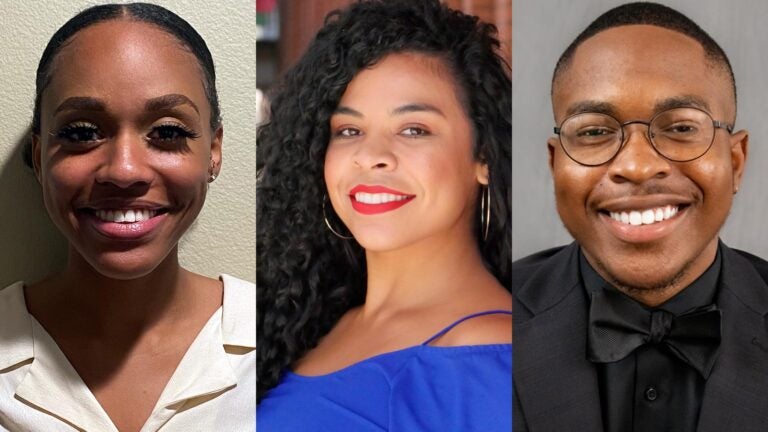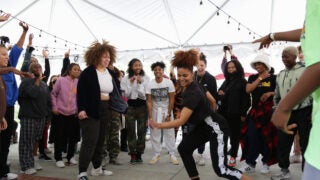
Jakaiya Burke, Natalie Hart and Lawrence Rolle, from left. (Photos, from left: Courtesy of Jakaiya Burke; Courtesy of Natalie Hart; BeeDee 2020)
Three students share what ‘the Black family’ means to them
Jakaiya Burke, Natalie Hart and Lawrence K. Rolle offer up their personal connection to the 2021 Black History Month national theme.
What does the phrase “the Black family” mean to Black students? Three USC students — Natalie Hart, doctoral candidate at the USC Rossier School of Education; Jakaiya Burke, a music industry major at the USC Thornton School of Music; and Lawrence K. Rolle, an MD/MBA candidate at the Keck School of Medicine of USC and the USC Marshall School of Business — share their personal connection to the 2021 Black History Month national theme.
Jakaiya Burke, programming chair for Black Student Assembly
Tell us about your family and how you feel connected to them and your ancestors.
I’m from Flint, Mich. My mom’s mom is from Tennessee and she moved to Michigan out of high school, but she’s really connected to Tennessee and has 13 brothers and sisters. My grandma didn’t really talk about our history and what happened back then, but there really is always an emphasis on family.
One way I feel connected to my family is through music. A lot of my family is from right outside Memphis, and I just love Memphis music and Memphis rap. They sound just like my family. The way they pronounce their words, I understand it because that’s how my family talks.
Natalie Hart, vice president of the Black Graduate Student Network and of the JENGA Doctoral Association
How do you identify, and how do you feel connected to your family history and ancestors?
I identify as Afro-Latina or Afro-Mexicana, so the African diaspora does not stop at Africa. Your multicultural background is something you take with you, and you can never take it off. My physical appearance precedes anything that comes out of my mouth, my character, who I am, the experiences I’ve had. So being knowledgeable about yourself and your history is important as you enter spaces you may not have navigated before.
For me, I think about this quote from Marcus Garvey: “People without knowledge of their past are trees with no roots.” That resonates with me. It’s important for me to know where I came from, to know the shoulders of giants I stand on. I believe I’m my ancestors’ wildest dreams.
I am super proud to inhabit two powerful minoritized communities. Not only do I stand on the shoulders of ancestors who were forced here from Africa, but I stand on the shoulders of folks whose land was taken from them. With my Mexican heritage, there are some strong family ideals. My mother is one of the strongest, most powerful people that I have ever met. She pushed into her kids the idea that, if this is what you’re passionate about, I’m behind you 100%. Those ideals spill over into both sides of my culture.
Lawrence Rolle, president of the Black Graduate Student Network and co-president of Keck Brothers in Medicine
How do you identify, and how has your family talked to you about your family history and roots?
I identify as Black. My mom’s side of the family is from Jacksonville, Fla., and my dad’s side of the family is from the Bahamas. Rolle is a common Bahamian name.
I was raised by my mom mainly, so I grew up around her side of the family. Unfortunately, I never met my maternal grandparents. I learn most of my family history from my mother or when I’m at family gatherings. Recently, we’ve been having a weekly Zoom since the pandemic started with my aunts and some cousins, which has definitely helped fill me in on my grandparents and how everyone lived.
To be honest, my dad hasn’t talked too much about his upbringing. Both my paternal grandparents are alive and living in the Bahamas. I’ll be going there again soon, and learning about them is on the top of my list.
What does “the Black family” mean to you?
The Black family means a lot to me. I feel like, despite what other narratives may exist, our family is our strength.



